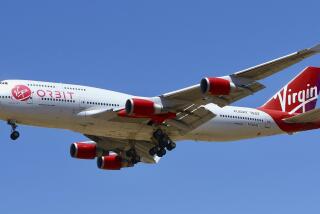McDonnell Wins Contract for Satellite Booster, Value Could Rise to $734 Million
- Share via
WASHINGTON — McDonnell Douglas was selected Wednesday over two rivals to build 20 modified Delta rocket boosters for an Air Force satellite program, an award potentially worth $734 million and an opportunity to recapture some commercial satellite launching business.
The Air Force began a crash development program last year to restore an alternative launch capability after the space shuttle Challenger disaster, which threatened to ground some of the service’s most important military space programs.
The Delta rocket, which McDonnell builds at its Astronautics unit in Huntington Beach, was selected over Martin Marietta’s Titan rocket and General Dynamics’ Atlas.
Big Business Opportunity
Although the Air Force contract gives McDonnell a big business opportunity, it carries enormous contractual risks. McDonnell would lose millions of dollars if even one of the 20 Deltas fails, and it would lose all of its profit if three of them fail.
Air Force officials said they selected McDonnell principally because its proposal was $250 million lower than each of the other two bids and provided for a schedule that was a year shorter than the rival proposals.
All three rockets have been in use for more than two decades and provide the only U.S. access to space until the next shuttle flight, which is scheduled for next year. The Delta, which is somewhat less powerful than either the Titan or the Atlas, has a three-stage, liquid-fueled propulsion system.
The Air Force contracted for a modified version of the Delta, formally known as the Delta II, which will provide more payload lift and a slightly larger satellite compartment than the original version of the rocket.
The Air Force plans to launch all 20 Deltas by 1991 to carry aloft its Navstar Global Positioning System satellites, which originally were to be launched aboard the shuttle. That system of 21 orbiting satellites will broadcast navigation signals, allowing users to locate their position within 16 meters anywhere on Earth.
McDonnell spokesman Jeff Fister said the Air Force contract will eventually boost Delta program employment from 1,200 to 1,800.
“This is a tremendous victory for McDonnell Douglas and for getting the nation’s space program back on track,” said C. James Dorrenbacher, vice president and general manager of the McDonnell Douglas plant in Huntington Beach.
Fister said the firm is holding four orders for Delta rockets from commercial customers that were contingent on winning the Air Force program. In addition, the National Aeronautics and Space Administration ordered four Deltas last September.
The company has a production capability to produce 12 Deltas a year. In an interview earlier this year, Dorrenbacher said he foresaw the need for at least 20 commercial satellite launches between 1988 and 1991.
Contract Includes Options
The Delta, however, may be limited in its ability to launch commercial satellites. A spokesman for Hughes Aircraft, the leader of the communications satellite industry, said Wednesday the Delta may not be capable of launching Hughes’ newest generation spacecraft, known as the HS 393, because the craft is too large to fit inside the rocket.
The contract awarded Wednesday was for $316.5 million for seven Delta IIs, with two annual options for a total of 13 additional Deltas. Altogether, the company would be paid $669 million for the 20 rockets. In addition, each successful launch will provide a $3 million incentive fee to McDonnell, a total of $60 million for the 20 launches. The company will also get $1 million annually for five years if it meets the contract requirements.
But any failures would be harshly penalized. One failure would mean forfeiture of the entire $60-million launch incentive. Two failures would mean forfeiture of half of the firm’s undisclosed profit, which is contained in the $669-million contract. If three launches fail, the firm would lose all profit and all incentives.
“The program carries big incentives for performance,” an Air Force official said. “It was contained in the request for proposal and all three bidders agreed to it.”
The Delta has one of the aerospace industry’s best records for reliability, with 167 successes and 12 failures. Statistically, the Delta would be due for a failure about every 14 launches, but it has done better in recent years. It had a string of 44 successes until a failure last May.
More to Read
Inside the business of entertainment
The Wide Shot brings you news, analysis and insights on everything from streaming wars to production — and what it all means for the future.
You may occasionally receive promotional content from the Los Angeles Times.











